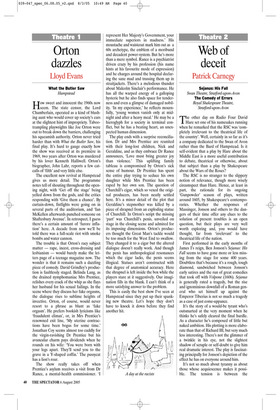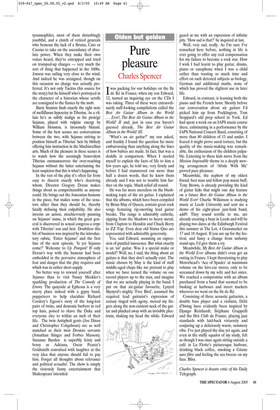Web of deceit
Patrick Carnegy
Sejanus: His Fall Swan Theatre, Stratford-upon-Avon The Comedy of Errors Royal Shakespeare Theatre, Stratford-upon-Avon The other day on Radio Four David Hare set one of his namesakes running when he remarked that the RSC was ‘completely irrelevant to the theatrical life of the country’. Well, certainly in so far as it’s a company dedicated to the Swan of Avon rather than the Bard of Hampstead. Is it self-evident that a play by Hare about the Middle East is a more useful contribution to debate, theatrical or otherwise, about that subject than a play by Shakespeare about the Wars of the Roses?
The RSC is no stranger to the slippery notion of relevance, though more wisely circumspect than Hare. Hence, at least in part, the rationale for its ongoing ‘Gunpowder’ season of plays, written around 1605, by Shakespeare’s contemporaries. Whether the responses of Massinger, Jonson and others to the dangers of their time offer any clues to the solution of present troubles is an open question, but their plays are very well worth exploring and, you would have thought, far from ‘irrelevant’ to the theatrical life of the nation.
First performed in the early months of James I’s reign, Ben Jonson’s Sejanus: His Fall seems to have gone more or less missing from the stage for some 400 years. Doubtless that’s because it’s a rough, tough diamond, sandwiched between Jonson’s early satires and the run of great comedies that took off with Yolpone (1606). Sejanus is generally rated a tragedy, but the rise and ignominious downfall of a Roman general who set himself up against the Emperor Tiberius is not so much a tragedy as a case of just come-uppance.
It’s the story of a would-be tyrant who’s outsmarted at the very moment when he thinks he’s safely cleared the final hurdle. As a character he’s composed of little but naked ambition. His plotting is more elaborate than that of Richard III, but very much less interesting. There’s not the glimmer of a twinkle in his eye, not the slightest shadow of scruple or self-doubt to give him real dramatic interest. The play is fascinating principally for Jonson’s depiction of the effect he has on everyone around him.
It’s not so much about tyranny as about those whose acquiescence makes it possible. The tension is between the tyrannophiles, most of them disturbingly youthful, and a clutch of retired generals who bemoan the lack of a Brutus, Cato or Cassius to take on the ascendancy of absolute power. When they make their own voices heard, they’re entrapped and tried on trumped-up charges — very much the sort of thing that happened in the 1600s. Jonson was sailing very close to the wind. And indeed he was arraigned, though on this occasion no charge was actually preferred. It’s not only Tacitus (his source for the story) but he himself who’s portrayed in the character of a historian whose scrolls are consigned to the flames by the mob.
Barry Stanton finds exactly the right note of mellifluous hypocrisy in Tiberius. As a villain he’s as subtly malign as his protégé Sejanus, played with vulpine energy by William Houston, is tiresomely blatant. Some of the best scenes are conversations between the two, with Sejanus striving to position himself as Tiberius’ heir by blithely offering him instruction in the Machiavellian arts. Much of the pleasure in these scenes is to watch how the seemingly benevolent Tiberius outmanoeuvres the over-reaching Sejanus without the latter entertaining the least suspicion that this is what’s happening.
In the rest of the play it’s often far from easy to discern exactly who’s deceiving whom. Director Gregory Doran makes things about as comprehensible as anyone could. He brings out the Jonsonian humour in the piece, but makes some of the senators sillier than they should be, thereby fatally defusing their culpability. He also invents an action, mischievously punning on Sejanus’ name, in which the great general is discovered in sexual congress a tergo with Tiberius’ son and heir. Doubtless this bit of business was inspired by the introductory rubric, ‘Enter Sejanus’ and the first line of the next episode, ‘Is yet Sejanus come?’ Welcome to Up Pompeii! If only Doran’s way with the humour had been embedded in the pervasive atmosphere of fear and danger that the play requires and which was in rather short supply.
No better way to reward yourself after Sejanus than to visit Nancy Meckler’s sparkling production of The Comedy of Errors. The quayside at Ephesus is a very merry place indeed with a gypsy band, puppeteers to help elucidate Richard Cordery’s Egeon’s story of the long-lost pairs of twins, and demonic barbers in red top hats, poised to shave the Duke and everyone else to within an inch of their life. The twin Antipholi gents (Joe Dixon and Christopher Colquhoun) are as well matched as their twin Dromio servants (Jonathan Slinger and Forbes Masson). Suzanne Burden is superbly feisty and bossy as Adriana, Oscar Pearce’s Goldsmith convulsed with laughter at the very idea that anyone should fail to pay him. Forget all thoughts about relevance and political actualité. The show is simply the riotously funny entertainment that Shakespeare intended.












































 Previous page
Previous page